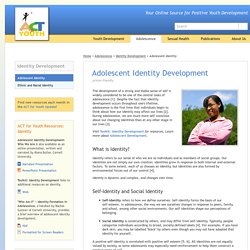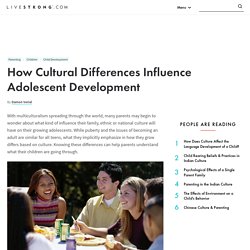

Adolescent Identity Development: What to Expect in Teens. Adolescent Identity Development: The Factors of Change Among the profound and exciting changes taking place in adolescence is the process of self-discovery. Our teens are working to figure out who they are, making adolescent identity development a central feature of teen life. Young people’s identities are shaped by lots of factors — family, cultural and societal expectations, experiences with institutions like school and the media, and friends. Young people also take active steps and make choices that shape their identity. They select the environments and people they want to be around.
Adolescent identity is developed, in part, based on relationships and feedback received from others. While your tween or teen may not be doing all of these, here are a few ways they may be changing as they seek answers to the question, “Who am I?” Early Adolescents (11-14): Middle Adolescents (14-18): Late Adolescents (18-24): How to teach kids to talk about taboo topics. Supporting Healthy Identity Development - Diversity. Does Your Teacher’s Identity Affect Your Learning? - Link Between Teacher and Student Identity. Learning Identity: A Sociocultural Perspective. The Kids (Who Use Tech) Seem to Be All Right. Social media is linked to depression—or not.

First-person shooter video games are good for cognition—or they encourage violence. Young people are either more connected—or more isolated than ever. Such are the conflicting messages about the effects of technology on children’s well-being. Negative findings receive far more attention and have fueled panic among parents and educators. This state of affairs reflects a heated debate among scientists. A new paper by scientists at the University of Oxford, published this week in Nature Human Behaviour, should help clear up the confusion. “This is an incredibly important paper,” says Candice Odgers, a psychologist studying adolescent health and technology at the University of California, Irvine, who wasn’t involved in the research. To date, most of the evidence suggesting digital technologies negatively impact young people’s psychological well-being comes from analysis of large, publicly available data sets.
That context is illuminating. Sociocultural approaches to literacy by Lina Trigos on Prezi. Sociocultural Constructions of Adolescence Yooung People s Literacies. ACT for Youth - Adolescence - Adolescent Identity Development. The development of a strong and stable sense of self is widely considered to be one of the central tasks of adolescence [1].

Despite the fact that identity development occurs throughout one's lifetime, adolescence is the first time that individuals begin to think about how our identity may affect our lives [2]. How Cultural Differences Influence Adolescent Development. The parents of adolescents have the main responsibility of teaching children ethics.

Scholars of adolescent behavior and authors of "Family and Peer Influences on Adolescent Behavior and Risk-Taking," Nancy Gonzales and Kenneth Dodge, note that while much of adolescent development happens outside the home, the culture of the family instills upon children their developmental roots. Parents coming from difference cultures emphasize different value sets and therefore teach their children different moral standards. For example, because honesty is an important concept in the West, American parents urge their children not to lie, even in situations where lying would be beneficial. On the contrary, parents from East Asia tend to focus on creating a sense of both social and family harmony. These parents are more willing to overlook lies, provided those lies contribute to harmony, such as in white lies that avoid hurting others' feelings. I am ... I am not ... Teens' Identity. 5 Major Social And Emotional Problems In Adolescence.
Is your identity given or created? Best Middle School Books, As Chosen by Teachers. 9.

The Giver Quartet by Lois Lowry Jonas lives in a society in which the government controls everything: childbearing, careers, marriages. His utopia has sacrificed emotions and uniqueness in favor of a safe and predictable life. When Jonas learns that life could be different, he can never turn back to the life he’s always known. 10. Ponyboy and his brothers, Darry and Sodapop have a tough life. 11. On a trip to visit her mother’s grave, Sal learns about herself and her family. 12. Is eternal life really that wonderful? 13. Bud Caldwell, is a 10 year old orphan who has grown up in Flint, Michigan. 14. What Is Sociocultural Theory? Sociocultural theory is an emerging theory in psychology that looks at the important contributions that society makes to individual development. This theory stresses the interaction between developing people and the culture in which they live.
Sociocultural theory also suggests that human learning is largely a social process. An Introduction to Sociocultural Theory Sociocultural theory grew from the work of seminal psychologist Lev Vygotsky, who believed that parents, caregivers, peers, and the culture at large were responsible for developing higher-order functions. According to Vygotsky, learning has its basis in interacting with other people. Vygotsky was a contemporary of other great thinkers such as Freud, Skinner, and Piaget, but his early death at age 37 and the suppression of his work in Stalinist Russia left him in relative obscurity until fairly recently. According to Vygotsky, children are born with basic biological constraints on their minds. Piaget vs. In the Classroom.